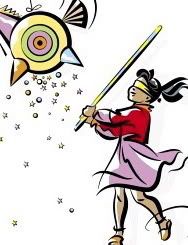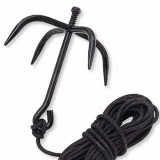
Well okay, Kindergarten. Kindergarten in Texas as a child, kindergarten in Alaska, New Mexico, and now Kansas, as a teacher.
In Texas, I learned I was strong. At the age of four-and-a-half, **I** was the one who broke the pinata at Halloween. To this day, I still have the memory of being blindfolded, with a stick of some sort in my hand, hearing "hit it Mica, hit it!" Then the feeling of contact, and the sound of hard candies hitting the bare floor. "Get the candy, get the candy!" I couldn't. I was too busy holding the corner of the blindfold up away from my eyes, watching the swarm of kids at my feet grabbing for the candy I had released from the paper mache prison. I'm strong. God bless the teacher who probably held the pinata down still where I could hit it.
I endured, sometimes enjoyed, and in the end survived the next twelve years of school, and attended college hoping to be a Broadcast and Journalism major. One horribly inappropriate instructor and enough views of news reporters on television shoving microphones into the faces of families who just experienced some horror, and my mind was forever changed. Back to "what I knew," since it was easier to draw upon my life's experiences as a teacher's kid... freed me up to go out and socialize, meet people, learn the right ways, and several wrong ways of interacting with others. Ta da, six years later (darn that socializing), and I had a Bachelor's Degree in Education.
I was hired late into the school year as a kindergarten teacher. Frankly, it was the **last** grade I ever thought I'd want to teach. I cried. Yes, cried, the night before I was supposed to meet my new students. The next day, with stinging, puffy eyes, I survived my re-introduction to the kindergarten world, thanks to wonderful students, and two amazingly terrific teachers. While one would move on to a principalship in another town, the other would become not so much a mentor, but a role model (I tend to observe, think things through, try them out on my own, and gauge the result BEFORE I ask for help) and eventually, the treasured shoulders, ears, and insights of a true friend I respected not only as a teacher but a human being. She observed, fine-tuned, overhauled, and encouraged my successes, and occasionally was hit by the shrapnel resulting from my clueless lack of experience. When one of her own former student teachers was added to our kindergarten team, I had yet another wonderful teacher from whom to learn. Our colleagues, their families, and our school's neighborhood, children and all, imprinted upon me so many memories, so many opportunities to build my own opinions, so many experiences... I had no idea how they would help me when I had to leave a decade later.
Uncle Sam decided to move my husband and thus, our family, to New Mexico, where I became employed in my second school district ever. Meeting my new colleagues, my new administrators, and my new students and families was quite the experience. No matter how diverse I had thought my decade teaching in Alaska had been, it turned out there was a great big world out there! Even in my own country, attitudes, biases, prejudices, beliefs and practices vary widely. Thankfully, I had taught long enough to recognize the social and professional choreography displayed at my new school. I was able to compare and contrast differences in office procedures, school routines, social cliques, curriculum, socio-economic boundaries, school culture, teaching styles, and school-wide discipline. Some practices, not many, were aligned with my own teaching philosophy and goals. Redundancies abounded, communication never made it completely around the loop, and in a predominantly Hispanic school district, I was asked several times WHY I had number and color words on my bulletin board in English AND in Spanish. On the upswing, my class size was limited to fifteen, and my students got along wonderfully with one another. They were happy, healthy, bright, eager, and kind, and their parents were extremely supportive and helpful. I had two wonderful practicum students who were more colleagues than pupils, and was able to build fun and supportive friendships with subs and parent volunteers. An occasional tray of homemade cookies left in the lounge always garnered thanks and smiles, so there weren't too many social obstacles for me to overcome.
Now, in my third state, and my third school, I'm still teaching kindergarten. Yet again, I've had to sit back, get the "lay of the land," and learn my steps in the new choreography. As I'm able to now compare and contrast practices between three schools, districts, and states, I feel comfortable that my experiences are adding up to help me pick and choose the best of all I have observed, been given, thought up on my own, and in some cases, endured, for the benefit of my students, their families, and my colleagues. My personal and professional philosophies have four supporters at this time: my husband, my kindergarten colleague, the speech therapist, and another teacher at work. Most everyone else with whom I've interacted has been taken aback, not quite sure of what they are observing. My discipline plan, my instructional practices, my vocabulary and tone with my students (and the students of other teachers), have all been questioned by support staff, colleagues, administrators and parents. My students' parents and the four supporters listed previously, seem to be the only adults who understand why I find it necessary to build relationships with my students, to help build relationships between my students, and work as much with the social skills as the academic. Relationship-building with colleagues who possess a similar amount of teaching experience or more has been awkward. I don't FIT. How I think, what I think, and what I do, are evaluated from a distance. My perspectives on discipline, developmentally appropriate practices, support for kindergarten teachers, relationship-building, and my regard for my students' emotional safety at school during this very special year are apparently perceived as odd, not the norm, perhaps even "off by a few bubbles." To feel so outnumbered by professionals who are consumed by what they themselves want from their students instead of what they want for their students is an odd position in which to find myself.
I recently attended a districtwide grade level meeting where most of the debate and discussions revolved around how to make the S.F.A. observers happy. How to get through the entire required curriculum when students wanted to spend more time on certain activities than others. How five year olds still weren't demonstrating perfect penmanship (we're only a month and a half into the school year as of this posting), and how teachers were thrilled their schools' "academic support" staff were allowed to take children into a back room of the building, and "put the fear of God into them" when they wouldn't comply. I was appalled, not only as a teacher, but as a mother. Only a small handful of teachers volunteered suggestions to help with curriculum issues, and our time at the meeting was limited to an hour. Feedback was requested which my grade level partner and I gladly provided, but I left the meeting feeling so outnumbered, and therefore not nearly as open to helping my fellow kindergarten teachers. While I have been providing feedback and hopefully supportive shoulders and ears like my very first role model did, I can't help but feel that without a public and high-enough-on-the-food-chain supporter and advocate, my hands are tied, and frankly, my philosophy is not a good match for this district.
Don't yell. Don't hurt peoples' feelings. Don't hit. Say "please" and "thank you." Eat a snack. Take a nap. Share. Walk with scissors. Don't eat glue. Remember to write your name on your paper, and share your books. Help your friends, smile at your teacher, at least be polite if you can't be nice. Life lessons taught in kindergarten don't often carry over into adulthood. And it's a shame. It's an even bigger shame when they don't carry over to the very people trusted to provide educational and emotional support to children for twelve or thirteen years.
We accommodate students, not the BRAND of the curriculum materials. Not the S.F.A. saleswoman or product support staff who come in and "spot observe" several times a year. I would never consider a doctor, lawyer, or mechanic truly qualified if they only came in to see me on their own schedule, on dates they chose as best for themselves. If they only did a looksie at my car without ever looking under the hood, smiled at me but didn't take my blood pressure and vitals, or only asked if I had a will or not, I wouldn't find them very helpful. Observers who only come in to see if each cutely named activity is being performed at the exact minute of the prescribed schedule... or to see if a poster is hung at the appropriate spot in my classroom , are completely missing out on what they should be there to observe: My students. Learning.
Other issues have had my attention in previous blog postings, and taking them into consideration with my latest observations, it's clear I have to go back to what I learned in kindergarten that October, thirty-two years ago: I'm strong. It's time to find a Master's Degree program, and then a Doctoral Program after that. Perhaps when I have enough letters of the alphabet after my name, my ideas won't seem alien, they'll seem revolutionary. And worth some contemplation and adoption.



